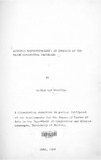| dc.description.abstract | This work is an attempt to describe the consonantal processes in Ekegusii using the theoretical assumptions and descriptive strategies of Natural Generative Grammar. The study highlights certain aspects of Ekegusii morphophonology, showing that phonological changes in the Language result from different factors. Our hypothesis is that given the nature of the processes, that is, the different factors which account for the changes, a theory with the kind of constraints found in Natural Generative phonology (NGG), can effectively describe the Ekegusii phenomena.
Phonological theories make claims about linguistic change by postulating principles which are to be employed in formulating the rules that can best describe the competence of ideal speaker-hearers of a language. While discussing the consonantal changes in Ekegusii, we test the validity of the claims made by NGG and our study reveals that although such phonological processes are motivated by different factors, the theory of Natural Generative phonology can account for all the changes in the language. Accordingly, we have demonstrated that consonantal processes in Ekegusii fall under two categories, namely, phonetically conditioned and morphosyntactically conditioned processes. | en_US |

